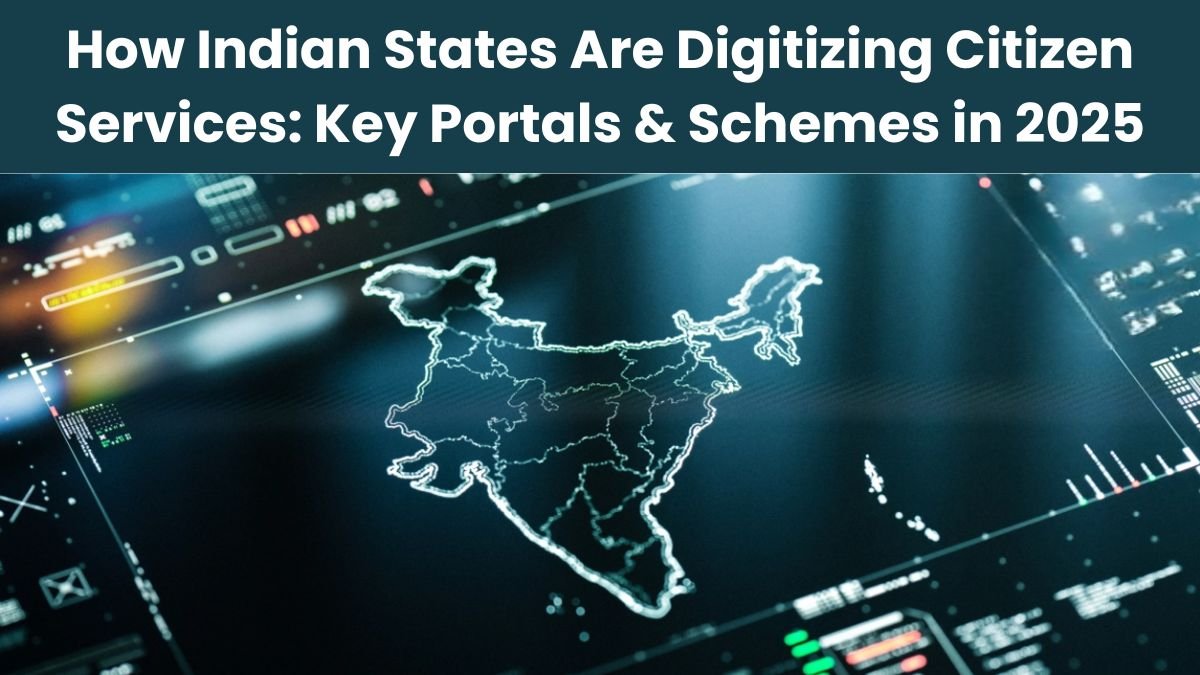Digitization of Citizen Services in India: In today’s digital age, the Government of India and state governments are increasingly using Digitizing technology to provide convenient, transparent and time-bound services to citizens. This change has become even faster especially in 2025. While earlier people had to visit government offices, now most of the services are available from home through online portals and mobile apps. This article will explain in detail how different states of India are digitizing citizen services, which portals are in the news in 2025 and which schemes are changing the lives of the general public.
Objective of Digitization
The main objective of digitization is to make government services:
- Transparent
- Efficient
- Accessible
- And time-bound.
This not only reduces corruption, but also makes it easier for citizens living in rural and remote areas to avail government services.
Maharashtra – ‘Majhi Sarkar Seva Portal’
The Maharashtra government has launched a comprehensive portal called “Majhi Sarkar” in which more than 400+ government services are being made available online. This portal allows citizens to fill application forms, upload documents and track the status of the service.
Key Services:
- Caste Certificate
- Resident Certificate
- Birth-Death Certificate
- Application for Water/Electricity Connection
Special Initiative: Maharashtra’s Right to Services Act gives citizens the legal right to receive services within the stipulated time frame.
Bihar – RTPS Service Portal and RTPS App
The Bihar government has started the facility of applying for caste, income and resident certificates through RTPS (Right to Public Services) portal and app.
Key Features:
- Application status information through SMS and email
- Facility to download certificate in 10-15 days
- No need to visit RTPS counter
2025 Update: Now digitally signed certificates are being issued on the RTPS portal which are considered valid in government and private works.
Madhya Pradesh – MP e-Nagar Palika and CM Dashboard
The MP government has made the services of the Municipal Corporation online through the e-Nagar Palika portal.
Services:
- Property tax payment
- Water tax payment
- Birth-death certificate application
CM Dashboard: An innovative initiative where the Chief Minister himself monitors the progress of citizen complaints and schemes online.
Uttar Pradesh – e-District Portal and ‘JanSunwai’ App
The e-District service scheme of the Uttar Pradesh government has become even more advanced in 2025.
Key Services:
- Marriage/Birth Certificate Application
- Income, Caste, Residence Certificate
- Old Age Pension, Widow Pension Application
Jan Sunwai App: Citizens can send complaints of any government department directly to the Chief Minister’s Office and also monitor the status.
Karnataka – Seva Sindhu Portal
The Karnataka government has integrated the services of all departments and made them available on the Seva Sindhu portal.
Key Departments:
- Labor Department
- Transport Department
- Education Department
- Revenue Department
What’s New in 2025: Now it is also possible to apply for COVID relief schemes, agricultural grants and scholarship schemes through Seva Sindhu.
Importance of Digital Signature and e-Governance
In 2025, state governments are not only providing services on the portal but also digitally signing documents to avoid any kind of fraud.
Features of e-governance:
- Transparency in government process
- Reduction in corruption
- Increasing trust of citizens
- Fast and reliable service delivery
Role of Jan Dhan, Aadhaar and Mobile (JAM Trinity)
The Government of India has further strengthened digitalization through the trinity of JAM (Jan Dhan, Aadhaar, Mobile). Almost all the state schemes are now linked to DBT (Direct Benefit Transfer), which directly transfers money to the beneficiary’s bank account.
Digital schemes for farmers and rural citizens
Haryana’s ‘Meri Fasal Mera Byora’ portal:
- Farmers register their crop information online
- Transparency in government procurement increases
- Payment is made directly into bank accounts
Other schemes:
- Digital Mandi Services
- Online Seed Subsidy
- MSP Information App
What are the challenges?
Although India has made great progress towards digitization, some major challenges still remain:
- Internet connectivity in rural areas
- Lack of technical knowledge
- Lack of cyber security
- Frequent portal downtime
- To address these problems, governments are running digital literacy programs.
Conclusion
In 2025, almost every state in India has taken a big leap in digitizing citizen services. Be it caste certificate, application in government schemes or complaint registration – everything is now happening through online portals and apps. This not only saves people’s time, but also takes strong steps towards a transparent and accountable administration.
In the future, when 5G, AI and the next phases of the Digital India Mission will be activated, these services will become even more accessible and effective. In such a situation, citizens should also adopt digital services and become proficient in their use.
